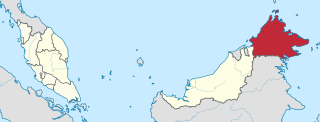
Sabah is a state of Malaysia located in northern Borneo, in the region of East Malaysia. Sabah has land borders with the Malaysian state of Sarawak to the southwest and Indonesia's North Kalimantan province to the south. The Federal Territory of Labuan is an island just off Sabah's west coast. Sabah shares maritime borders with Vietnam to the west and the Philippines to the north and east. Kota Kinabalu is the state capital and the economic centre of the state, and the seat of the Sabah State government. Other major towns in Sabah include Sandakan and Tawau. The 2020 census recorded a population of 3,418,785 in the state. It has an equatorial climate with tropical rainforests, abundant with animal and plant species. The state has long mountain ranges on the west side which forms part of the Crocker Range National Park. Kinabatangan River, the second longest river in Malaysia runs through Sabah. The highest point of Sabah, Mount Kinabalu is also the highest point of Malaysia.

Kota Kinabalu, colloquially referred to as KK, is the state capital of Sabah, Malaysia. It is also the capital of the Kota Kinabalu District as well as the West Coast Division of Sabah. The city is located on the northwest coast of Borneo facing the South China Sea. The Tunku Abdul Rahman National Park lies to its west and Mount Kinabalu, which gave the city its name, is located to its east. Kota Kinabalu has a population of 452,058 according to the 2010 census; when the adjacent Penampang and Tuaran districts are included, the metro area has a combined population of 628,725. The 2020 Census revealed an increase in the municipal population to 500,421, while the wider area including the Penampang and Putatan districts had a population of 731,406.

Christianity is a minority religion in Malaysia. In the 2020 census, 9.1% of the Malaysian population identified themselves as Christians. About two-thirds of Malaysia's Christian population lives in East Malaysia, in the states of Sabah and Sarawak. Adherents of Christianity represent a majority (50.1%) of the population in Sarawak, which is Malaysia's largest state by land area. Christianity is one of four major religions, including Islam, Hinduism, and Buddhism, that have a freedom protected by the law in Malaysia based on diversity law especially in East Malaysia.

Keningau is the capital of the Keningau District in the Interior Division of Sabah, Malaysia. It is the fifth-largest town in Sabah, as well one of the oldest. Keningau is between Tambunan and Tenom. The town had an estimated population of 173,130. Dusuns, Muruts and Lundayehs is the major ethnics in Keningau.

Tambunan is the capital of the Tambunan District in the Interior Division of Sabah, Malaysia. Its population was estimated to be around 35,667 in 2010. It is located 80 kilometres east of the state capital, Kota Kinabalu, 48 kilometres south of Ranau and 48 kilometres north of Keningau. At an average altitude of 750 metres, this valley town, which is part of the Crocker Range, experiences a mild tropical climate all year long. The valley is peppered with terraced paddy fields and 70 villages. The dense forests of bamboo around Tambunan town are a legacy of the British colonial period, during which an edict stated that 20 bamboo sprouts had to be planted for every bamboo cut.

The Murut, alternatively referred to as Tagol/Tahol, constitute an indigenous ethnic community comprising 29 distinct sub-ethnic groups dwelling within the northern inland territories of Borneo. Characterized by their rich cultural diversity, the Murutic languages form a linguistic family encompassing approximately half a dozen closely intertwined Austronesian languages. Murut populations exhibit dispersion in Malaysia's Sabah and the northern part of Sarawak, as well as in the country of Brunei and the Indonesian North Kalimantan Province. Furthermore, the Murut people have close connections with the Tidung, who historically inhabited Borneo's east coast region that underwent processes of Islamization and Malayalization,
Mount Trusmadi or Trus Madi is a mountain located at the Interior Division of Sabah, Malaysia. It is considered as the second highest mountain in both Sabah and Malaysia at 2,642 metres (8,668 ft), after Mount Kinabalu with Trusmadi offering a tougher climbing challenge than the latter.
Datuk Seri Panglima Stephen Robert Evans (1935–2017) SPDK, JP was a politician, public administrator and author from Sabah, Malaysia.

The history of Sabah can be traced back to about 23–30,000 years ago when evidence suggests the earliest human settlement in the region existed. The history is interwoven with the history of Brunei and the history of Malaysia, which Sabah was previously part of and is currently part of respectively. The earliest recorded history of Sabah being part of any organised civilisation began in the early 15th century during the thriving era of the Sultanate of Brunei. Prior to this, early inhabitants of the land lived in predominantly tribal societies, although such tribal societies had continued to exist until the 1900s. The eastern part of Sabah was ceded to the Sultan of Sulu by the Sultan of Brunei in 1658 for the former helping a victory over Brunei enemies, but many sources stated it had not been ceded at all. By the late 19th century, both territories previously owned by Sultan of Brunei and Sultan of Sulu was granted to British syndicate and later emerged as British North Borneo under the management of the North Borneo Chartered Company. Sabah became a protectorate of the United Kingdom in 1888 and subsequently became a Crown colony from 1946 until 1963, during which time it was known as Crown Colony of North Borneo. On 16 September 1963, Sabah merged with Malaya, Sarawak and Singapore to form Malaysia.
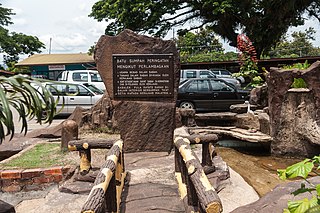
The Keningau Oath Stone is a monument in Keningau, Sabah which was specially erected to commemorate the merger of the British Crown Colony of North Borneo with the former colony of Sarawak and states of the Federation of Malaya to form Malaysia.

Sabah is the third most populous state in Malaysia, with a population of 3,418,785 according to the 2020 Malaysian census. It also has the highest non-citizen population, at 810,443. Although Malaysia is one of the least densely populated countries in Asia, Sabah is particularly sparsely populated. Most of the population is concentrated along coastal areas, with towns and urban centres seeing the most population growth.
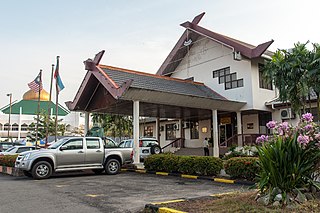
The Beaufort District is an administrative district in the Malaysian state of Sabah, part of the Interior Division which includes the districts of Beaufort, Keningau, Kuala Penyu, Nabawan, Sipitang, Tambunan and Tenom. The population of Beaufort is composed mainly of Bisaya, Brunei Malays, Kadazan-Dusuns, Lun Bawang/Lun Dayeh, Muruts and Chinese.

The Keningau District is an administrative district in the Malaysian state of Sabah, part of the Interior Division which includes the districts of Beaufort, Keningau, Kuala Penyu, Nabawan, Sipitang, Tambunan and Tenom. The capital of the district is in Keningau Town. The town comprises a majority native Dusun as well as Murut population with significant Chinese minorities.

The Nabawan District is an administrative district in the Malaysian state of Sabah, part of the Interior Division which includes the districts of Beaufort, Keningau, Kuala Penyu, Nabawan, Sipitang, Tambunan and Tenom. The capital of the district is in Nabawan Town.

The Tambunan District is an administrative district in the Malaysian state of Sabah, part of the Interior Division which includes the districts of Beaufort, Keningau, Kuala Penyu, Nabawan, Sipitang, Tambunan and Tenom. The capital of the district is in Tambunan Town.
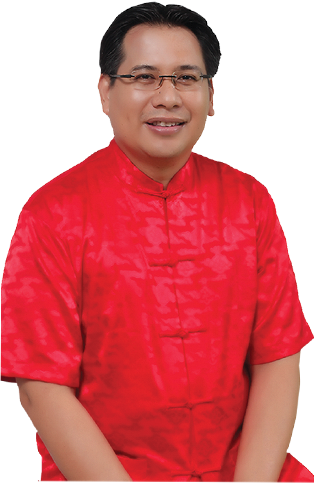
Yamani Hafez bin Musa is a Malaysian politician who served as the Deputy Minister of Finance II in the Barisan Nasional (BN) administration under former Prime Minister Ismail Sabri Yaakob and former Minister Tengku Zafrul Aziz from August 2021 to the collapse of the BN administration in November 2022, Member of Parliament (MP) for Sipitang from May 2018 to November 2022 and Chairman of FELCRA Berhad from July 2020 to September 2021. In 2019 until 2022, He was a former member of the Malaysian United Indigenous Party (BERSATU), a component of the Perikatan Nasional (PN) coalition. He is also the son of Musa Aman, the former Chief Minister of Sabah. In 2023, He is an official member of the Sabah People's Ideas Party, a component of the Gabungan Rakyat Sabah (GRS) coalition.

Sandakan Heritage Museum is a museum located at the 1st floor of Wisma Warisan building in Sandakan of Sabah, Malaysia. The museum building is located next to the Sandakan Municipal Council and is part of the Sandakan Heritage Trail.
The COVID-19 pandemic was confirmed to have reached Sabah, Malaysia, in March 2020. As of 16 November 2022, there are 402,031 confirmed cases.
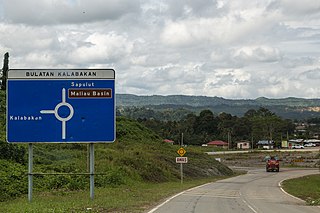
Kalabakan is a district in the Malaysian state of Sabah, located approximately 235 kilometres (146 mi) southeast of the state capital of Kota Kinabalu. It recorded a population of 48,195 people in the 2020 Malaysian census. Its capital is the town of Kalabakan.



















